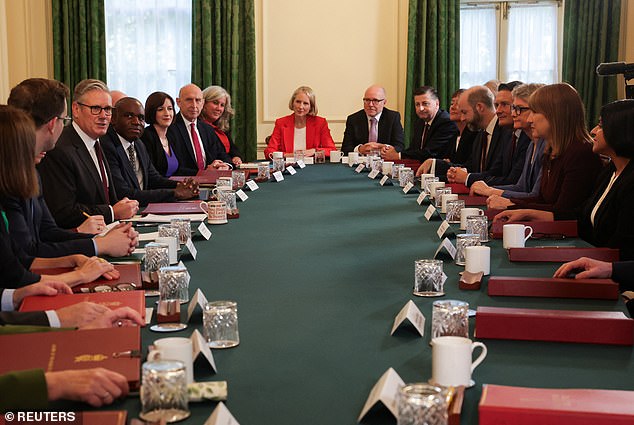Keir Starmer has been trying to steady the ship after a whirlwind weekend in Westminster.
Following Angela Rayner’s dramatic exit from government, the Prime Minister faced his Cabinet with a firm reminder that reviving Britain’s struggling economy must be their top priority.
Gathered around the famous No10 table, with a “Prime Minister” mug in front of him, Sir Keir spoke to his new team with a mix of urgency and determination.
He told them that growth is now the “number one priority,” and that the reshaped Cabinet must deliver results for working people.
Rallying the Cabinet After a Rough First Year
It’s no secret that Sir Keir has had a rocky start to his premiership.
His first year has been overshadowed by fierce public anger over immigration and policy missteps that left the government looking unsteady.
Polling hasn’t helped either—one survey from More in Common revealed his personal approval ratings have sunk to a new low of minus 44.
But in spite of the gloom, Starmer painted this moment as the beginning of a new phase.
“You are the right people to heed the patriotic call to lift up our country and take it forward,” he urged his ministers.
The Shock of Angela Rayner’s Departure
Friday brought a political earthquake when Angela Rayner suddenly quit after a damning standards report ruled she had breached the ministerial code over her tax affairs.
Her resignation left a hole in government—and set off a domino effect of high-profile reshuffles.
Rayner’s former position as deputy PM has been handed to David Lammy, who now also carries the weighty Justice Secretary brief.
Meanwhile, Yvette Cooper has stepped into the role of Foreign Secretary, while Shabana Mahmood has taken on the crucial job of Home Secretary, promising to get tough on the issue of small boat crossings in the Channel.
The Cabinet Shake-Up and Its Big Changes
The reshuffle didn’t stop there. Work and Pensions Secretary Liz Kendall has been shifted into science and technology after MPs resisted attempts to slash the welfare budget.
In her place, Pat McFadden is now tasked with tightening welfare spending—seen as essential for Chancellor Rachel Reeves to balance the nation’s books.
Other notable moves include Steve Reed heading up Housing and Communities, Peter Kyle leading Business and Trade, and Emma Reynolds taking over Environment.
Douglas Alexander is now Scotland Secretary, while Sir Alan Campbell leads the House of Commons.
A Brewing Battle for Deputy Leadership
While Starmer focused on economic revival, another storm has been brewing inside Labour ranks: the race for deputy leadership.
Education Secretary Bridget Phillipson quickly threw her hat into the ring, with Downing Street viewing her as the preferred candidate.
But the contest may not be straightforward.
Former colleague Lucy Powell is tipped as a possible challenger, with vocal backing from Andy Burnham—himself often seen as a future contender for the party leadership.
The Prime Minister’s Rallying Cry
Despite the tensions and reshuffles, Starmer is determined to frame his government as united and purposeful.
His spokesman said the message to ministers was simple: delivery and growth must be “front and centre” as the government enters its second phase.
In his own words, Starmer described the team as “a government of patriots—determined to deliver for working people. That’s who we fight for.”
Keir Starmer’s New Cabinet at a Glance
- David Lammy – Deputy Prime Minister and Justice Secretary
- Darren Jones – Chancellor of the Duchy of Lancaster and Chief Secretary to the PM
- Yvette Cooper – Foreign Secretary
- Shabana Mahmood – Home Secretary
- Steve Reed – Housing, Communities and Local Government Secretary
- Pat McFadden – Work and Pensions Secretary
- Peter Kyle – Business and Trade Secretary
- Liz Kendall – Science, Innovation and Technology Secretary
- Emma Reynolds – Environment Secretary
- Douglas Alexander – Scotland Secretary
- Jonathan Reynolds – Chief Whip
- Sir Alan Campbell – Leader of the House of Commons
What Comes Next?
For Keir Starmer, the next few months will be crucial.
With public patience wearing thin, internal rivalries heating up, and the economy still in need of revival, his reshaped Cabinet faces enormous pressure to deliver.
Whether this fresh team can restore confidence—or deepen the sense of drift—will define the second chapter of his premiership.
